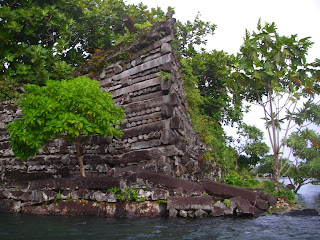The Joy of Researching for a Game
One of my favorite parts of preparing for a game session is researching details and fascinating sources of inspiration. In a setting based on our own world, I like to include people, places and things from our own history and geography. Like setting an adventure in the Wieliczka Salt Mines of Poland. (Pictured below)
When the setting is a fantastical realm unlike our own, I might still include details borrowed from the real world... Maybe the local chefs specialize in fixing haggis, and the players might find out just how the dish is made.
Tabletop RPGs are a great source of entertainment, but that doesn't mean they can't be informative as well. Some of the most interesting concepts for adventures could come from real life facts of science and history. Explorer type players will benefit especially from these inclusions, as they provide a new level of immersion and provide them with something interesting to discover in the game world.
 |
| Wielicza Salt Mines |
It can also lead to further interesting discussion and drive the players to do their own research into a subject that peaks their curiosity. I once ran a World War Two themed adventure which used historical elements of Tokyo Rose, The Treaty of San Francisco, and the sunken city of Nan Madol. While I didn't bore the players with the extensive factual details of these events, their inclusion made laid out a cool and immersive foundation for the story. It also helped to provide some much-needed inspiration, rather than forcing me to wrack my brain for a purely original concept for an adventure.
 |
| Nan Madol, Micronesia |
Research like this shouldn't be a chore, of course. Sometimes I will listen to an educational program while I tackle errands and chores, and will finish with a bunch of ideas to integrate into my next campaign. I highly recommend checking out some documentaries and podcasts when you have the time between game sessions. Any media that could be relevant to the kind of story you want to tell can be a great source of material. (I will post some of my favorite sources in a future entry.)
And of course, even browsing Wikipedia can provide some juicy tidbits of material. It doesn't have to be an academic-level source or citation, just a modicum of reality to spice things up. In fact, sometimes historical events that might not have happened could be a great addition to your game, like Archimedes' mirror-based Heat Ray. It's a neat idea, and your players may enjoy finding out more about that particular ancient anecdote.
Once again, there is no need to worry greatly about factual accuracy or turn your game table into a lecture hall. But there is so much to draw from in the world around us that it makes sense to use it to enhance our games. I highly encourage every game master to consider this and do their own research to incorporate these kinds of details into their future campaigns.
Happy ventures!




No comments:
Post a Comment